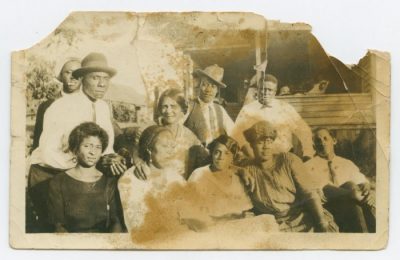This week’s blog post was researched and written by the Digital Newspaper Unit’s student assistant, Sarah Cunningham. Sarah is a dual-Masters student in History and Information Science. In History, she has studied under Drs. Todd Moye and Andrew Torget, researching civil rights and Texas History.
The Denton Women’s Interracial Fellowship began in 1964 at the height of the Civil Rights Movement, consisting of African-American and Anglo-American women in Denton. With school integration on the horizon, the women were  concerned about their children’s adjustments to what they feared would represent a tense process. To ease this process, the founders of the Women’s Fellowship believed that interracial harmony would curb racial tensions within the community when the women could get to know each other better. This was the start of my research of the Denton Women’s Interracial Fellowship.
concerned about their children’s adjustments to what they feared would represent a tense process. To ease this process, the founders of the Women’s Fellowship believed that interracial harmony would curb racial tensions within the community when the women could get to know each other better. This was the start of my research of the Denton Women’s Interracial Fellowship.
My research for the Denton Women’s Interracial Fellowship began in Dr. Todd Moye’s, Director of the UNT Oral History Program, course, Techniques of Oral History. Our initial research into the history of the Fellowship began with listening to oral history interviews from the late 80s, and proceeded to re-interviewing those Fellowship members still living in Denton today. Each student in Dr. Moye’s class interviewed two women. Listening to the interviews as a class, we collectively coded them for seven major themes or topics and curated those themes into an online museum, Desegregating Denton. Subsequently, each student prepared a biography about the women they interviewed.
 I also wrote interpretive essays about how members of the Fellowship contributed to the history of Denton. Aside from using past and present oral interviews for my biographical sketches and essays, I incorporated Texas Digital Newspaper Program titles, particularly The Campus Chat and the North Texas Daily, to understand how the history of Jim Crow segregation in Denton related to and affected the activities of these women. Researching the Fellowship and its members on The Portal to Texas History offered a user-friendly search engine with which I was able to analyze and understand the dedication to public service in the community that these women demonstrated–many were teachers in the Denton school system, including Carol Riddlesperger; Linnie McAdams served on city council; and Euline Brock became a mayor of Denton. Through this work, I learned so much about the rich history of Denton’s African-American community, Quakertown (pictured above), and how Denton became racially-segregated by the early-twentieth century.
I also wrote interpretive essays about how members of the Fellowship contributed to the history of Denton. Aside from using past and present oral interviews for my biographical sketches and essays, I incorporated Texas Digital Newspaper Program titles, particularly The Campus Chat and the North Texas Daily, to understand how the history of Jim Crow segregation in Denton related to and affected the activities of these women. Researching the Fellowship and its members on The Portal to Texas History offered a user-friendly search engine with which I was able to analyze and understand the dedication to public service in the community that these women demonstrated–many were teachers in the Denton school system, including Carol Riddlesperger; Linnie McAdams served on city council; and Euline Brock became a mayor of Denton. Through this work, I learned so much about the rich history of Denton’s African-American community, Quakertown (pictured above), and how Denton became racially-segregated by the early-twentieth century.
